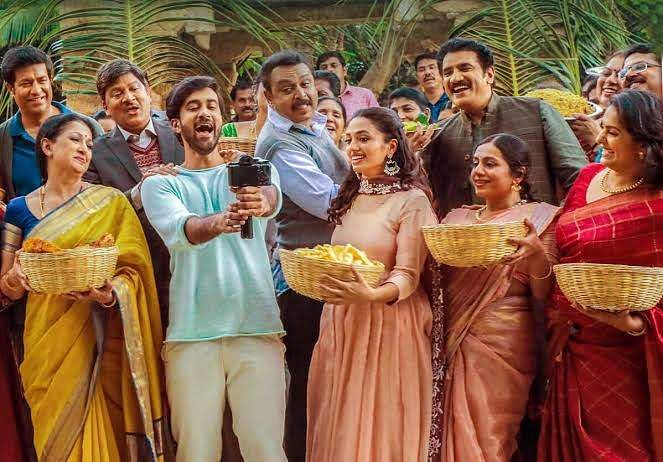The essence of ancient Greek philosopher Marcus Aurelius’s words “Love the hand that fate deals you and treat it as your own” finds poetic parallels in Rahman’s lyrics of a song in Anni Manchi Sakunamule (AMS), where the latter writes “anni manchi sakunamule anukuni saagithe / anni manchi sakunamule avunani nammithe / edhaloni diggule aasale velugai raadha”.These lyrics, an ode to optimism straight out of the late Sirivennela Sitharama Sastry’s school of letters, are also notably preceded by lines on the power of fate over free will — verses that would have sounded a lot more grim on their own. The placement of these words in a song, which features in the intro credits of the film, also doubles up as a prescient reminder of the quote “All’s well that ends well”. There are a lot of events in AMS to illustrate the random and thoroughly lopsided hand of fate, events that are consistently punctuated by moments of transient, buoyant joy that are plucked and presented from life as it leaps by. Amor Fati meets La Dolce Vita. Broadly speaking, there is veluthuru (light) and velithi (paucity) and between them both lies AMS.
Director – Nandini Reddy
Cast – Santosh Shoban, Malavika Nair, Naresh, Rao Ramesh, Rajendra Prasad, Gautami
It is safe to assume that a lot of us don’t feel like we truly belong where we are, especially in our youth, constantly negotiating a minefield of expectations, identities, insecurities and real-time challenges. One might always tend to feel the grass is greener on the other side. Nandini Reddy takes this commonplace existential conflict and gives it a switcheroo treatment, last seen in Trivikram’s Ala Vaikuntapuramulo, with a “will they won’t they” romantic conflict thrown in for good effect. There are two instances in the film when Arya (Malavika Nair) reminds Rishi (Santosh Shoban) of his mother and father, respectively. In any other film, this would have been an endearing set of coincidences that reaffirm the other person’s potential as a partner but in AMS, they foreshadow a disturbing secret that will take their lives by storm. But even without that secret looming around, this provides an interesting backdrop against which two individuals’ chalk and cheese differences can be etched neatly. I am reminded of Venky Atluri’s Rang De, where the hero is shown having a close relationship with the heroine’s mother alongside its heroine having a rapport with the hero’s father, and how that is contrasted with the relationship the leads have with their own parents. The knowledge of Arya’s and Rishi’s true parentage keeps our interest in the story going, despite us having an inkling of how the film will eventually end. There is a sense of satisfaction we get as viewers, when we see Arya possess a business acumen that Rishi’s dad Prasad (Rajendra Prasad) has, which is quickly followed by the scene where we see Rishi heal someone with acupuncture, not very different to the way Arya’s dad (Naresh) treats patients with homeopathy. Amidst the coffee plantations of AMS’s Victoriapuram, the apples don’t fall far off the two (family) trees.
The film is surrounded by a range of interesting, memorable characters, who provide both warmth and dimension to the characterisations of Arya and Rishi. While Gautami has an extremely soothing screen presence, almost as tranquil as the hills this story is set amidst, Rao Ramesh (we might as well call him Thagubothu Ramesh here, pun intended), Naresh and Rajendra Prasad are the strong pillars of AMS, providing support, heft and due foundation against which the film can rest. Ashwin Kumar Lakshmikanthan, despite looking the part perfectly, makes for an odd casting, thanks to an incomplete character arc and a jarring choice of an all-too-familiar voice actor. Along with two families, there are also two kinds of people in AMS. One, who obsesses about money and the future against party two, that values altruism and living in the moment. This juxtaposition almost makes AMS look like a first world cousin of Srikanth Addala’s Seethamma Vakitlo Sirimalle Chettu. Though AMS and SVSC are unique stories in their own right, the key takeaway from these two films, which occurs in the last half an hour of the film with lives saved, render these two features as some unlikely but amusing kindred spirits.
For all the expansive and dramatic maneuvering AMS has succeeded in, leading to some deeply emotional pay-offs, the romance of the leads feels lost in transition. There is a strong sense of them as individuals but very little of who they are or rather, who they possibly could have been together. I kept hoping the film circled around to that at some point, but alas. Right to the end, the film continues to be about them as individuals with some memorable (and scarring) shared history. And much like a student who studied almost but not entirely for an exam, there are some comprehensive answers in the film alongside some half-baked ones. Speaking of which, it was interesting to watch a film where its love language was a slice of cake and not, say, a gulab jamun. Every film does not (and should not) be this way, but it is good to have something novel and wholly comfortable in its own niche world, once in a while. There is a scene in the film where two grown-ups are seen faux smoking some phantom cigarettes and that is pretty much what AMS as a whole is, against a world of movies featuring men chain smoking for the heck of it. Nostalgia, bonding, sweet to the point of cloying but nevertheless, adorable all around.
#Sweet #soul #heavy #heart #Cinema #express

